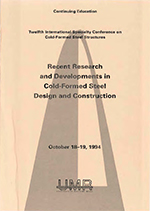Location
Saint Louis, Missouri
Session Dates
18 Oct 1994
Abstract
Concrete filled tubes are likely to be economical with the use of very high strength concretes and thin-walled steel tubes. The strength of the steel tube is affected by local buckling effects which may also influence the confinement to the concrete infill. Very high strength concretes exhibit rapid unloading in the post-ultimate region. The strength of the composite column is not a simple superposition of strengths of the individual steel and concrete components. This paper describes the initial tests of an experimental program to determine the effects of local buckling on concrete filled tubes. Tubes with a diameter to wall thickness ratio of 165 were filled with 120 MPa (17.4 ksi) concrete and tested mainly in axial compression. Measurements of geometric properties including imperfections, material properties of the concrete and steel including residual stresses, and the strain and axial shortening behaviour of the tubes under load are presented. The test equipment and procedures developed for the program are described. The use of an effective area approach to account for local buckling of the tube wall is considered and compared with the test results. The significance of local buckling and concrete confinement is discussed.
Department(s)
Civil, Architectural and Environmental Engineering
Research Center/Lab(s)
Wei-Wen Yu Center for Cold-Formed Steel Structures
Meeting Name
12th International Specialty Conference on Cold-Formed Steel Structures
Publisher
University of Missouri--Rolla
Document Version
Final Version
Rights
© 1994 University of Missouri--Rolla, All rights reserved.
Document Type
Article - Conference proceedings
File Type
text
Language
English
Recommended Citation
O'Shea, Martin D. and Bridge, Russell Q., "Tests of Thin-walled Concrete-filled Steel Tubes" (1994). CCFSS Proceedings of International Specialty Conference on Cold-Formed Steel Structures (1971 - 2018). 3.
https://scholarsmine.mst.edu/isccss/12iccfss/12iccfss-session7/3
Tests of Thin-walled Concrete-filled Steel Tubes
Saint Louis, Missouri
Concrete filled tubes are likely to be economical with the use of very high strength concretes and thin-walled steel tubes. The strength of the steel tube is affected by local buckling effects which may also influence the confinement to the concrete infill. Very high strength concretes exhibit rapid unloading in the post-ultimate region. The strength of the composite column is not a simple superposition of strengths of the individual steel and concrete components. This paper describes the initial tests of an experimental program to determine the effects of local buckling on concrete filled tubes. Tubes with a diameter to wall thickness ratio of 165 were filled with 120 MPa (17.4 ksi) concrete and tested mainly in axial compression. Measurements of geometric properties including imperfections, material properties of the concrete and steel including residual stresses, and the strain and axial shortening behaviour of the tubes under load are presented. The test equipment and procedures developed for the program are described. The use of an effective area approach to account for local buckling of the tube wall is considered and compared with the test results. The significance of local buckling and concrete confinement is discussed.



